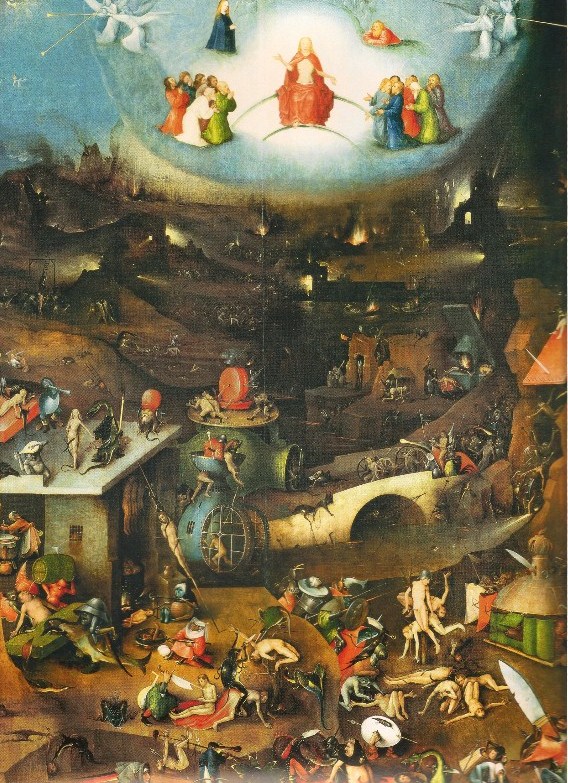I’ve always been fascinated by the Robert Frost poem “Fire and Ice,” where he imagines the hell awaiting us with a New England reserve that hides the horror he actually feels. Frost, like many of our great writers, realizes that the greatest hells are internal. Or put another way, hell is a metaphor for dark states of mind and for people’s tortured relationships:
Some say the world will end in fire,
Some say in ice.
From what I’ve tasted of desire,
I hold with those who favor fire.
But if it had to perish twice,
I think I know enough of hate
To say that for destruction ice
Is also great
And would suffice.
A New Yorker article by Brad Leithauser recently reflected on the hot and cold hells that various authors have conjured up, both literal (cold with Dante, hot with Milton) and metaphorical. I appreciate the list, especially since our library book group recently discussed the book that contains Leithauser’s nominee for the worst cold hell. At the end of Edith Wharton’s Ethan Frome, Frome must listen perpetually to the complaints of both his wife and of the the woman who survived their joint suicide attempt. Here’s Leithauser:
“Hell is other people,” Sartre advises us, though Wharton seems to be saying, “Hell is having to listen to others.” She takes a sort of malevolent relish in pointing out just how poisonous those female voices surrounding Ethan are: the “flat whine,” the “querulous drone,” the “monotonous mildness” of somebody who “spoke only to complain, and to complain of things not in his power to remedy.”
You’ll probably want to read the article but here’s Leithauser’s list of hot hells and cold hells. Feel free to add to the list:
Hot Hells
–Pap’s rages in Huckleberry Finn
–The Cyclops Polyphemus’s eating spree in The Odyssey
–The giant’s pursuit in “Jack and the Beanstalk”
–The protohuman giant confronting the men in Journey to the Center of the Earth
–Grendel’s attacks
–The crocodile chasing Hook in Peter Pan
–Henry James’s lurking beast in The Beast in the Jungle
–Aschenbach’s vision of a crouching tiger in Death in Venice
–The ghosts in Turn of the Screw about to possess the children
–Theodore Roethke’s drunk father “waltzing” with his small child
Cold Hells
–Claggart’s treachery in Billy Budd
–The scheming Moriarty and Fu Manchu
–The Biblical serpent proffering the apple
–Snow White’s mother doing the same
–Catherine Sloper’s doomed spinsterhood in Washington Square
–Ethan Frome doomed to live forever with two miserable women
–Beatrice Trueblood in the Jean Stafford short story retreating into hysterical deafness
–Anthony Hecht gazing at a gas chamber just liberated by the allies
Here are a few of my own favorite literary hells:
John Wilmot, “The Fall”
How blest was the created state
Of man and woman, ere they fell,
Compared to our unhappy fate:
We need not fear another hell.
George Bernard Shaw, Man and Superman
As saith the poet, “Hell is a city much like Seville.”
Christopher Marlowe, Doctor Faustus
Faustus: How comes it then that thou art out of hell?
Mephistophilis:Why this is hell, nor am I out of it:
Think’st thou that I, who saw the face of God,
And tasted the eternal joys of heaven,
Am not tormented with ten thousand hells,
In being depriv’d of everlasting bliss?
Doctor Faustus again
Mephistophilis: Hell hath no limits, nor is circumscribed
In one self place; for where we are is hell,
And where hell is, there must we ever be :
And, to conclude, when all the world dissolves,
And every creature shall be purified,
All places shall be hell that is not heaven.
Milton, Paradise Lost
Horror and doubt distract
His [Satan’s] troubled thoughts, and from the bottom stir
The hell within him; for within him Hell
He brings, and round about him, nor from Hell
One step, no more than from Himself, can fly
By change of place.
Wordsworth, “Tintern Abbey”
…evil tongues,
Rash judgments, nor the sneers of selfish men,
Nor greetings where no kindness is, nor all
The dreary intercourse of daily life…
Wordsworth, Intimations of Immortality
Full soon thy Soul shall have her earthly freight,
And custom lie upon thee with a weight
Heavy as frost, and deep almost as life!
Eliot, Waste Land
Here is no water but only rock
Rock and no water and the sandy road
The road winding above among the mountains
Which are mountains of rock without water
If there were water we should stop and drink
Amongst the rock one cannot stop or think
Sweat is dry and feet are in the sand
If there were only water amongst the rock
Dead mountain mouth of carious teeth that cannot spit
Here one can neither stand nor lie nor sit
There is not even silence in the mountains
But dry sterile thunder without rain
There is not even solitude in the mountains
But red sullen faces sneer and snarl
From doors of mud-cracked houses
Send in your own favorites.


